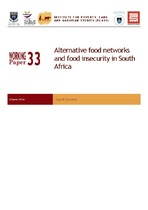| dc.contributor.author | Haysom, Gareth | |
| dc.date.accessioned | 2019-03-14T11:00:46Z | |
| dc.date.available | 2019-03-14T11:00:46Z | |
| dc.date.issued | 2016-06 | |
| dc.identifier.citation | Haysom, G., 2016 Alternative food networks and food insecurity in South Africa, Working Paper 33. Cape Town: PLAAS, UWC and Centre of Excellence on Food Security. | en_US |
| dc.identifier.uri | http://hdl.handle.net/10566/4521 | |
| dc.description.abstract | Food security remains a persistent global challenge. Inequality means that food insecurity is
disproportionately experienced. Despite positive shifts in the state of food security at a global scale,
recent reports from the Food and Agricultural Organisation suggest that in Africa the total number of
undernourished people continues to increase. The paper argues that there is a certain “stuckness” in food
security responses. The mutually converging transitions of the urban transition, food regime shifts and
the nutrition transition demand different ways of understanding the food system, food security and the
components thereof, including value chains. The paper reviews efforts designed to respond to these
mutually reinforcing challenges but argues that generalisations are problematic. Borrowing concepts
from the North is equally problematic. Using the concept of Alternative Food Networks (AFNs), the paper
interrogates these networks and asks how such alternative networks manifest in the context of food
insecurity in South African cities. AFNs evident in Northern cities and regions are generally privileged and
present a perspective of the food system that prioritises sustainability and a deep green and often local
ethic, embodying aspirations of food system change. In Southern cities, food system engagement is less
about engagement for change, but rather, engagement to enable food access. Traditional value chain
parlance sees a value chain extending from producer to consumer. The food access value chain present
within poor urban communities in South Africa reflects more than just financial transactions.
Transactions of reciprocity and social exchange are embedded within food security strategies, and are
often informed by the enactment of agency. Using the term “the food access continuum” this paper calls
for a far more expansive view of food access strategies and networks. Understanding these networks is
essential to effective food and nutrition security policy and programming. | en_US |
| dc.language.iso | en | en_US |
| dc.publisher | Institute for Poverty, Land and Agrarian Studies, University of the Western Cape | en_US |
| dc.relation.ispartofseries | Working Paper;33 | |
| dc.subject | Food insecurity | en_US |
| dc.subject | Alternative food networks | en_US |
| dc.subject | Urban food security | en_US |
| dc.subject | Agency | en_US |
| dc.subject | Food governance | en_US |
| dc.title | Alternative food networks and food insecurity in South Africa | en_US |
| dc.type | Working Paper | en_US |

